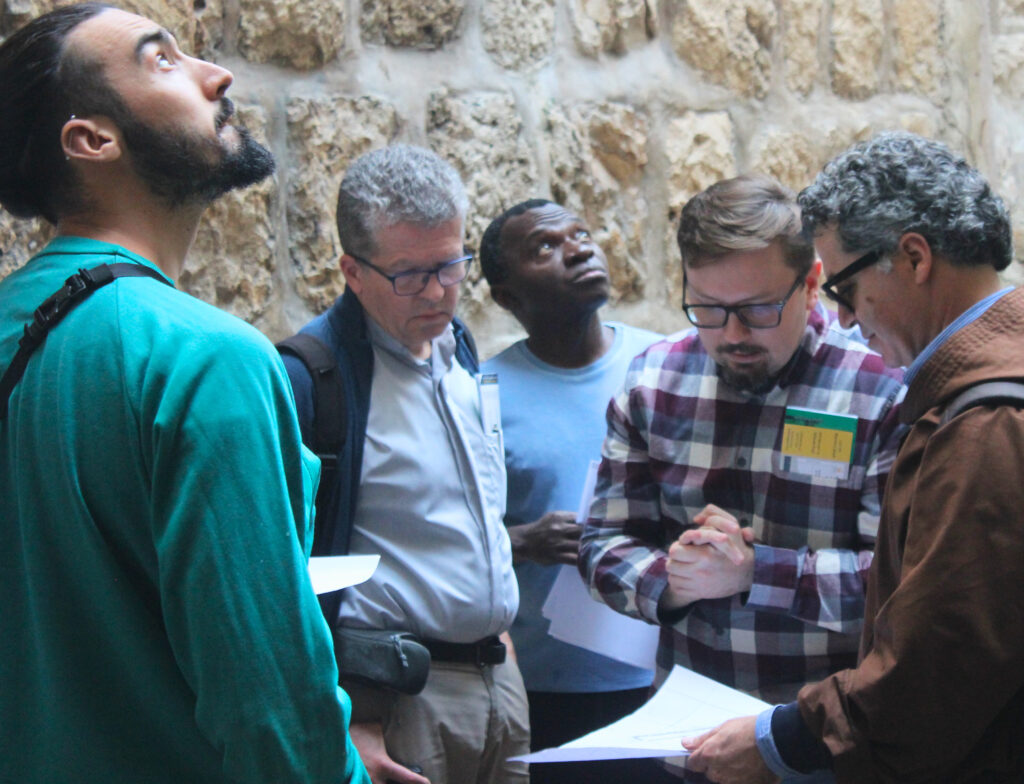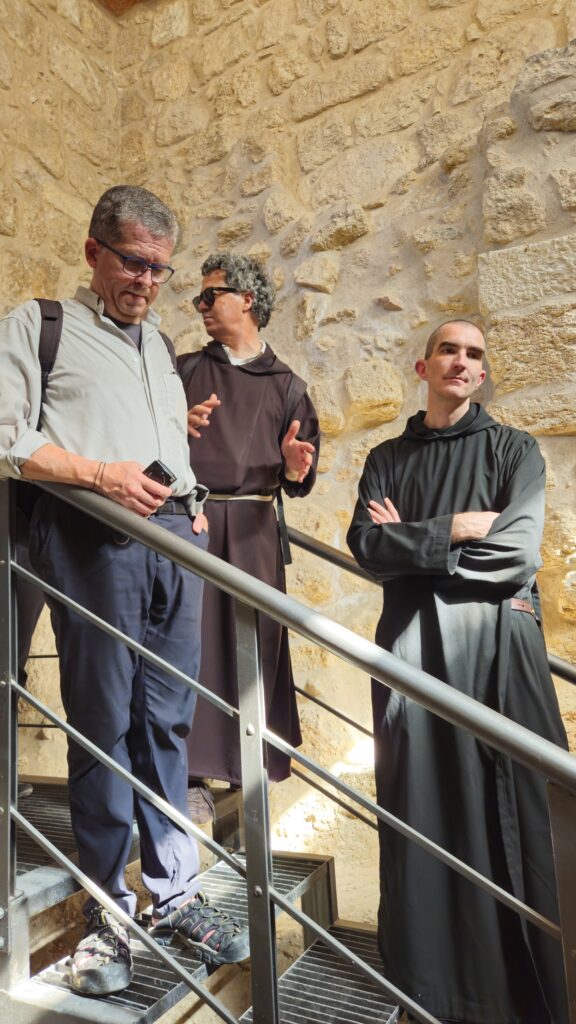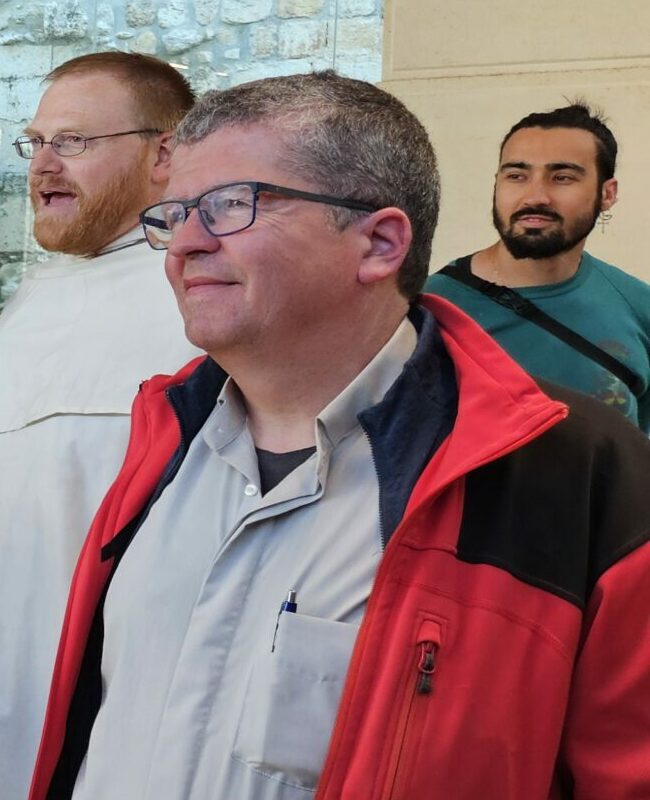Could you please introduce yourself?
I’m Fr. Andreas Bergmann, SJ, coming from Germany. For the last 15 years I lived and worked as a vicar of a Jesuit parish of 4000 peoples in Uppsala, a small city close to Stockholm (Sweden). One of my assignments was to teach in our faculties: the Newman Institute. Finishing my ministry in parish, I was granted a sabbatical of a year and looked at different options: staying in Sweden, going to Germany or exploring other options Finally I met the Dominicans in Lund, Sweden who simply suggested : “Why don’t you spend your sabbatical in Jerusalem?” Since I have already been there in 1997 and 1998 as a volunteer in a home for disabled children in Beit Jala, which I remembered as a very good experience, I thought it might be good to come back. Having always been interested in archeology and theology, I thought it could be a good idea to study at the ÉBAF.
How are you living this experience of study sabbatical?
Since I’m here on a sabbatical, there is no need nor pressure to go after study points, so I picked some topics I was interested in and chose a variety of lectures and seminars I enjoyed very much. For instance, a seminar with Fr. Anthony about the Gospel of Luke, I also attended the lecture of Fr. Boris, a fellow Jesuit, about the Gospel of Matthew, and I was drawn to the topography excursions and study trips we have made with Fr. Yunus all around the Holy Land. Apart from that, I decided to write an essay on Paul : “Paul between hellenism and Judaism” in reference to his early letters. It keeps me quite busy. In fact we had a seminary about the Gospel of Luke in Greek, another one about Acts of the Apostles, and in that context I came across a book that intrigued me written by Pamala Eisenbaum “Paul was not a Christian” to be understood as He was a jew. That led me into investigating that area a bit further, how Jewish or how Hellenistic Paul actually was.
What attracted you at the Ebaf?
The ÉBAF has many strengths. One is the student group we have here, very talented, capable of a number of languages, each working on a specific topic. It is most inspiring how they work together and how they approach their subject. Then of course, I am most grateful for the professors we have here, incredibly competent. Apart from that I would say its location. In reference to archeology, it acts as a base to go onsite. Finally, I would also say the compound of the ÉBAF, particularly the library that really encourages studying diligently. The École itself is fascinating: I don’t know any place that has this kind of resources available. In particular if you take into account that in Jerusalem you have many possibilities to encounter Jewish theology more closely. That’s something which I wasn’t too knowledgeably familiar with previously, but here I increasingly understood the relevance of that aspect.
 Photo : ÉBAF, Ordo Prædicatorum. Cours de topographie.
Photo : ÉBAF, Ordo Prædicatorum. Cours de topographie.
How do you articulate reason and faith in this context?
Since I am a Jesuit I would say the approach, how you interpret the Scriptures, how you handle Biblical texts, might be how one reconciles reason with faith. You are not only capable of explaining the historical background and context of the books, but you are also capable of imagining, meditating on anything associated with Biblical texts. It is the main tool in order to keep heart and mind together, though it remains an ongoing challenge, used and trained much more to perceive the word with our brain. That was one of the things I very much appreciated in the lectures. In many lectures, we also deal with art, which gives a possibility to approach the texts not only from an intellectual point of view.
Staying in Jerusalem, what does Holy Land means to you?
Holy Land… At the moment it does not feel very holy. Since I was here before, 1997-1998 was a period of time between the first and second intifada with suicide bombings happening. There was still some kind of hope that a peaceful development could be possible. So in my first years I thought I was relatively knowledgeable about the situation, but I had to realise it was a huge error. I did not expect the situation to become that desperate, it has kept deteriorating these last years. So the word holy is difficult to apply to the current situation. There are different perceptions of holiness: Jewish orthodox theology, isn’t that difficult to digest? As the Patriarch Pizzaballa said “We have hope, but no solution” and that I thought a well-phrased distinction, and a good summary.
 Photo : ÉBAF, Ordo Prædicatorum. Cours de topographie.
Photo : ÉBAF, Ordo Prædicatorum. Cours de topographie.
What are your main experiences of this sabbatical year?
The experience with spending time abroad is when you return home: you realise what has changed in your life. Right now I’d say the numerous experiences I’ve had at the ÉBAF were incredible and I’m still trying to sort out what the most relevant ones are.
What would you say to somebody willing to come to Ebaf?
Come, just come! Don’t miss the chance. Don’t be worried about the situation. The ÉBAF is safe and you’ll be able to tell your family and friends that you are ok. It’s hard to communicate that, particularly in Jerusalem, you live very safely. The image you receive from the media doesn’t faithfully represent what is happening here.
A message for our donors?
I hope you will appreciate what you support here. Your help cannot be measured in numbers. Whoever comes here and stays for a while will not only be changed for themselves, but will most importantly change their perception of the Holy Land.

